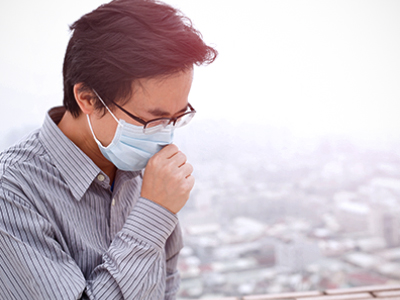
Air pollution impacts are now seen at a genetic level.
Air pollution is the third most important risk factor for global mortality. “It’s a massive problem,” says Vancouver Coastal Health Research Institute scientist Dr. Chris Carlsten. Dr. Carlsten has just completed a review of the latest research linking air pollution from traffic to allergic respiratory disease. The review found allergic disease is on the rise in many regions of the world, particularly in Asia, where traffic pollution is most severe. And the new reality of climate change is making things worse.
“Climate change is so important to factor in. It increases the intensity of both particulate matter in traffic pollution and of allergen concentrations. Our own research here in Vancouver highlights how significant these two factors are for triggering and worsening allergic respiratory disease.”
When temperatures increase, particularly in heat waves, respiratory deaths increase. Research shows that warmer temperatures and more sunshine also boost harmful ozone levels in traffic pollution. Increased heat also leads to drier conditions which can lead to wildfires, further exacerbating poor air quality conditions. This was the case in Vancouver during the summer of 2015 when an air quality advisory was issued recommending that people with chronic medical conditions remain inside. Climate change also increases airborne allergens; warmer temperatures boost pollen production and weeds—which produce more allergen pollen—can outperform other plants in hotter weather.

The review shows that when clean air legislation is enacted, it prevents premature deaths from respiratory disease. In many parts of the world however, this legislation isn’t in place yet. Dr. Carlsten is hopeful things will improve, but believes instances of allergic disease will worsen first.
“I’m actually encouraged by how seriously countries like China are taking this. Unfortunately, the air pollution levels right now will very likely result in an epidemic of disease down the road. Asthma rates are increasing already because that disease develops more quickly but diseases like lung cancer will be slower to develop.”
Dr. Carlsten says it’s important to keep doing research to make a strong argument for cleaner air policy.
“This is something I struggle with every day. My day-to-day professional focus is asking: So what can we do? I have to come back to the power of science to objectively show, to a range of constituents, that there are real biological changes we know will get worse with climate change. We have to have current and compelling data to so.”
Pollution causing genetic change
Some of that current and compelling data is at the genetic level. In his own lab, Dr. Carlsten and his team have found what are called epigenetic changes occurring when diesel exhaust is inhaled.

Dr. Carlsten says when the diesel particulate inhalation is combined with allergen inhalation, the “dimming effect” on gene expression is much more pronounced. “This genetic change is observed in a very short and reversible test in our lab. Out in the real world, especially in a warmer climate, the exposure can be more severe. This epigenetic changes to our systems could be at least partially responsible for increasing asthma and respiratory disease rates globally.”


